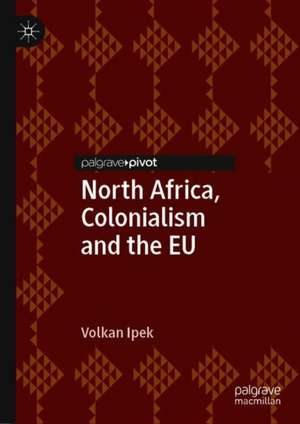North Africa, Colonialism and the EU
Autor Volkan Ipeken Limba Engleză Hardback – 10 dec 2019
Preț: 416.71 lei
Nou
Puncte Express: 625
Preț estimativ în valută:
79.75€ • 86.59$ • 66.99£
79.75€ • 86.59$ • 66.99£
Carte tipărită la comandă
Livrare economică 23 aprilie-07 mai
Preluare comenzi: 021 569.72.76
Specificații
ISBN-13: 9783030295882
ISBN-10: 3030295885
Pagini: 282
Ilustrații: VII, 122 p.
Dimensiuni: 148 x 210 mm
Greutate: 0.31 kg
Ediția:1st ed. 2020
Editura: Springer International Publishing
Colecția Palgrave Pivot
Locul publicării:Cham, Switzerland
ISBN-10: 3030295885
Pagini: 282
Ilustrații: VII, 122 p.
Dimensiuni: 148 x 210 mm
Greutate: 0.31 kg
Ediția:1st ed. 2020
Editura: Springer International Publishing
Colecția Palgrave Pivot
Locul publicării:Cham, Switzerland
Cuprins
1. Introduction to the King’s European Morocco.- 2. Creation of Hybridity in Morocco: 1912-1925.- 3. Nullification of French Protectorate and Colonialism Impacts: 1956-1984.- 4. The King’s European Morocco.- 5. Engagement with Europe: The Cases of Tunisia-Algeria-Malta-Cyprus-Turkey.- 6. Conclusion to the King’s European Morocco.
Notă biografică
Volkan Ipek is Assistant Professor of Political Science and International Relations at Yeditepe University, Turkey.
Textul de pe ultima copertă
This book explains the postcolonial nationalism theory of Morocco focusing on the nation’s membership application to the European Economic Community (EEC) in 1987 through the initiatives of King Hassan II. The project examines why states, such as Morocco, that have been geographically beyond the classical European borders felt European in terms of self-identity. The author uses a comparative approach, studying Tunisia, Algeria, Malta, Cyprus, to postulate why these states have opted not to apply for EEC. This work brings a new approach to the Europe-Africa relations and revisits the concept of the European enlargement.
Volkan Ipek is Assistant Professor of Political Science and International Relations at Yeditepe University, Turkey.
Caracteristici
Discusses the Moroccan's self-identity, nationalism theory, and its relation with France Presents a postcolonial nationalism theory on Moroccan self-identity Revisits the concept of the European enlargement and explains why North African states were rejected
